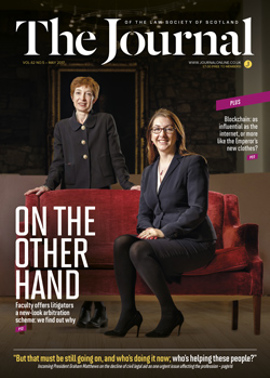Law reform roundup
The Society’s committees have been working on a number of Scottish and UK Parliament bills and consultations. Key areas are highlighted below. For more information see: www.lawscot.org.uk/law-reform
Child Poverty (Scotland) Bill
The Family Law Committee responded to the Scottish Parliament Social Security Committee’s call for written evidence. Overall, it believes that the Scottish Government’s ambition to eradicate child poverty in Scotland by 2030 is to be commended. The bill will increase the profile of child poverty and encourage debate as to how to address it.
The committee suggests that the definition of “child” should clearly include all persons aged up to 18. This would be consistent with the Children and Young People (Scotland) Act 2014. It would also welcome the establishment of a National Poverty & Inequality Commission in Scotland, as an independent body providing oversight of the progress being made in relation to the aims in the bill.
SLAB code of practice
The Criminal Legal Aid Committee responded to the Scottish Legal Aid Board consultation on changes to the code of practice regarding criminal legal assistance.
It called for SLAB to postpone the proposed new code until new legal aid fees for providing police station advice are agreed. It also expressed significant concern about the overlap between the draft code and the existing regulatory framework for solicitors, which creates a risk of misinterpretation and potential conflict. Other key issues with the draft code include lack of a clear process for incidents of non-compliance and action that might be taken by SLAB; increased administrative burden; and inconsistency and lack of clarity in obligations on solicitors, solicitor advocates and advocates.
Draft Prescription (Scotland) Bill
The Obligations Committee responded to the Scottish Law Commission’s call for evidence on the draft bill. It fully supports the Commission’s review. The committee has previously stated that much time and expense is wasted in raising protective proceedings, which could be mitigated if the starting date for the prescriptive period was clearer and there was the ability to postpone the period through the use of standstill agreements.
Gender balance on public boards
The Equalities Committee responded to the Scottish Government’s consultation on the practical application of the draft Gender Representation on Public Boards (Scotland) Bill. It highlighted that many high-quality responses were submitted when ministers previously consulted in 2014; those should be revisited as part of the current process.
The concept of gender used in the draft bill is a binary approach. This does not account for people who consider themselves to be genderqueer or of a third gender. Further, it is not immediately clear what sanction, if any, is proposed against an organisation that does not comply with the requirements in the draft bill.
Future of the Scottish planning system
The Planning Law Committee responded to the Scottish Government’s consultation. The committee welcomes the fact that the Government agrees with the findings of the independent panel commissioned in 2015 and supports the continuation of a plan-led system. It believes that many of the reforms, if implemented correctly, have the potential to improve development planning.
The response highlighted key factors and risks to be taken into account in ensuring that changes are practically workable and do not result in unintended negative consequences. Some areas of concern are identified. One of the most important considerations is ensuring that the detail of the proposed changes, for example the suggested shift towards regional partnership working, succeeds in delivering the stated objectives.
Integrated Authorisation Framework
The Environmental Law Committee responded to the joint consultation from the Scottish Environment Protection Agency and Scottish Government on the introduction of an Integrated Authorisation Framework. It supports the aims of simplifying the system and reducing the regulatory burden, but more detail is needed on how certain aspects of the framework would operate; in particular, how the proposed universal principles would apply in terms of creating legally enforceable obligations. Legal certainty must be achieved across all aspects of the regime if the aims are to be delivered.
Gender pay gap
Valerie Dougan of the Equality & Diversity Committee gave evidence to the Scottish Parliament’s Economy, Jobs & Fair Work Committee on 18 April. The latter committee is holding an inquiry into the effect of the gender pay gap on the Scottish economy, with a particular focus on business performance, the Scottish public sector and Scottish Government action required to address the issue. The evidence session can be viewed on the Scottish Parliament website.
The Policy team can be contacted on any of the matters above at policy@lawscot.org.uk. Twitter: @lawscotIn this issue
- “Without prejudice” save as to costs?
- Sanction for counsel: the new landscape
- Keeping payment practice up to scratch
- Access and the call of nature
- Why punish?
- Caught in the past
- Reading for pleasure
- Opinion: Louise Johnson
- Book reviews
- Profile
- President's column
- PAS proves a hit
- People on the move
- Beating the system?
- People perspective
- Leaving the EU: the legislative future
- Ledger for the digital age
- Charities - navigating a new landscape
- Do you know how much is enough to retire?
- Don't call it just a job
- Sanction: appeals not encouraged
- Child abduction: two aspects
- Challenges of gender identity
- Prior warnings and reasonable belief
- Powers in the past
- Scottish Solicitors' Discipline Tribunal
- Missives: can we conclude more quickly?
- Life beyond in-house
- Law reform roundup
- Career planning for women: a new conference
- AML: regulations bring new focus
- Fraud and cybersecurity: are you on the ball?
- Ask Ash
- Incidental financial business licence: the widening scope
- Love me, love me not?
- Appreciation: Kirk Murdoch
- Expert Witness Index 2017
- All in together






